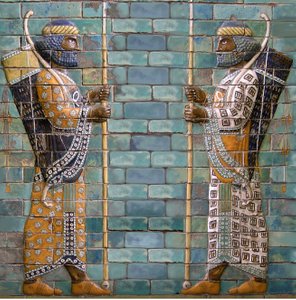Taxation and Administration in the Achaemenid Empire
This website is part of the project “Paying for All the King’s Horses and All the King’s Men. A Fiscal History of the Achaemenid Empire”. It provides information on the project in general, on the various sub-projects through which we study taxation and administration in the Achaemenid Empire, and the publications that result from our work. It also features brief articles (in English) on a variety of related topics for a broader audience, as well as educational material about the Persian Empire (in Dutch).
The Project
General aim
We aim to investigate taxation and administration in one of the first world empires, the Achaemenid or first Persian Empire (ca. 550-330 BC).
The Achaemenid Empire
In ancient perception, this empire was a ‘global’ state. According to estimates, it contained slightly less than half of the world’s population at its time. It covered a surface of approximately eight million square kilometers, stretching from Libya to modern day Afghanistan. This immense space had never been united under one rule in history before. The diversity of local customs and institutions posed an unprecedented logistical and administrative challenge. The aim of this project is to find out how the Persian system of taxation and fiscal administration contributed to expanding and maintaining this huge empire.
© Hansueli Krapf
© Hansueli Krapf
A Comprehensive Approach
Until few years ago, before scholars like Michael Jursa began to screen the Babylonian sources for information on taxation, it was usually Herodotus’ account of the tribute imposed by the Achaemenid king Darius I on his subject populations that was used as the prime source for information. We are now in the fortunate position to be able to study a large number of primary sources from the Achaemenid Empire itself. Cuneiform administrative and legal texts allow us to gain insights into taxation and administration from a local perspective. Most of our sources come from archives from the empire’s two core regions, Iran and Babylonia. The roughly contemporaneous archives will now be studied together in a larger undertaking for the first time. There are also sources from other regions of the empire (Egypt, Bactria, Idumea) written in Aramaic. We will organize a workshop to which we will invite the scholars working in this field in order to exchange ideas on the interpretation of these documents.
Organization
Financing
The project “Paying for All the King’s Horses and All the King’s Men. A Fiscal History of the Achaemenid Empire” is financed by the Netherlands Organization for Scientific Research (NWO) in the framework of its Innovational Research Incentives Scheme Vidi (€ 800.000). In 2015, Kristin Kleber received an additional Aspasia grant by NWO of which € 50.000 were added to finance this research project.
Duration
The duration of the grant is September 2014 - August 2019.
Institutional Embedding
The project is carried out at the Vrije Universiteit Amsterdam (VU), where it is embedded in the interdisciplinary research institute CLUE+.
© 2015-20 Achaemenid Taxation Project




